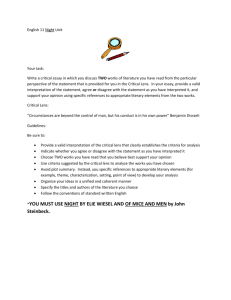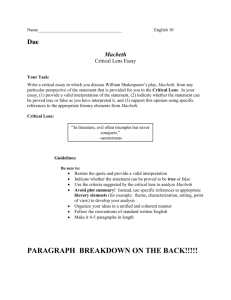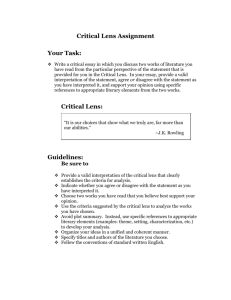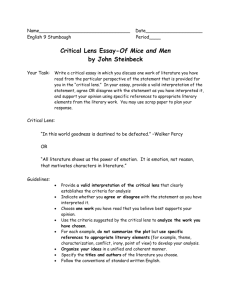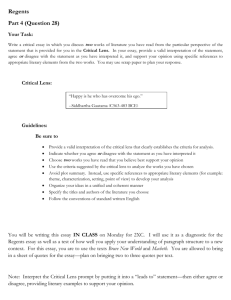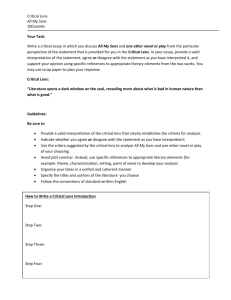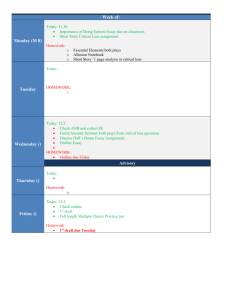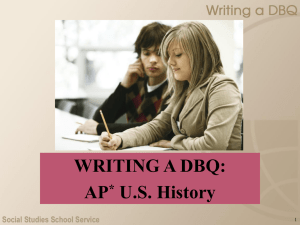Critical Lens
advertisement
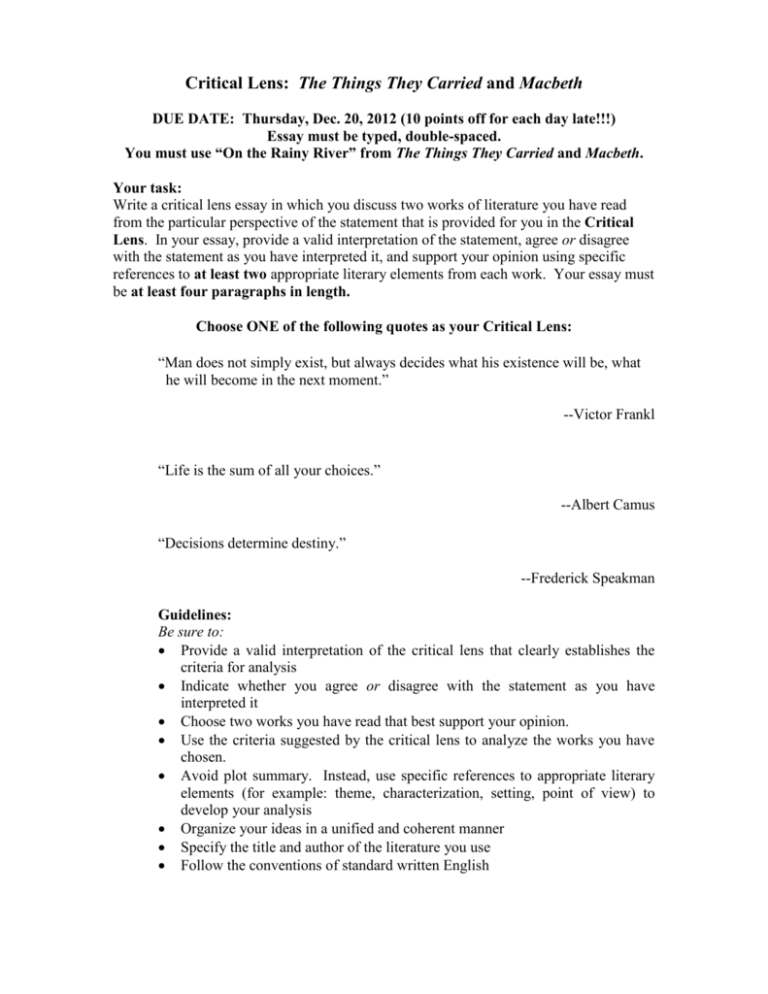
Critical Lens: The Things They Carried and Macbeth DUE DATE: Thursday, Dec. 20, 2012 (10 points off for each day late!!!) Essay must be typed, double-spaced. You must use “On the Rainy River” from The Things They Carried and Macbeth. Your task: Write a critical lens essay in which you discuss two works of literature you have read from the particular perspective of the statement that is provided for you in the Critical Lens. In your essay, provide a valid interpretation of the statement, agree or disagree with the statement as you have interpreted it, and support your opinion using specific references to at least two appropriate literary elements from each work. Your essay must be at least four paragraphs in length. Choose ONE of the following quotes as your Critical Lens: “Man does not simply exist, but always decides what his existence will be, what he will become in the next moment.” --Victor Frankl “Life is the sum of all your choices.” --Albert Camus “Decisions determine destiny.” --Frederick Speakman Guidelines: Be sure to: Provide a valid interpretation of the critical lens that clearly establishes the criteria for analysis Indicate whether you agree or disagree with the statement as you have interpreted it Choose two works you have read that best support your opinion. Use the criteria suggested by the critical lens to analyze the works you have chosen. Avoid plot summary. Instead, use specific references to appropriate literary elements (for example: theme, characterization, setting, point of view) to develop your analysis Organize your ideas in a unified and coherent manner Specify the title and author of the literature you use Follow the conventions of standard written English How to Structure the Critical Lens Essay INTRODUCTORY PARAGRAPH: · State the critical lens quote directly, with quotation marks and who said it. For example: According to Fred Flintstone, “Yabba, Dabba, Do.” · Put the quote into your own words. Use a simple interpretation that you can prove/disprove with works you have read. For example: In other words, life is great. · State whether the quote is true or false (agree or disagree) – USUALLY EASIER TO AGREE. · Introduce the two works you will use to prove/disprove your interpretation of the quote in the order you’ll address them. Include genre and author. If you are using a play or a novel (any of the books we read this year), the title is underlined. · Mention how both authors use literary elements when proving the validity or falsehood of the quote. If you introduce the specific elements you're going to discuss, you must introduce them in the order you'll address them in the essay. Reiterate your controlling idea in different words. BODY PARAGRAPH 1: · Address work 1. First, in one to two sentences, summarize what the first work is about. · Identify how this work proves or disproves your interpretation of the critical lens quote. · Show how the writer uses AT LEAST TWO literary elements to help prove/disprove the quote. · Be as specific as possible with literary elements. REMEMBER THAT POINT OF VIEW IS NOT RELEVANT IN A PLAY!!! BODY PARAGRAPH 2: · Address work 2. First, in one to two sentences, summarize what the first work is about. · Identify how this work proves or disproves your interpretation of the critical lens quote. · Show how the writer uses AT LEAST TWO literary elements to help prove/disprove the quote. · Be as specific as possible with literary elements. REMEMBER THAT POINT OF VIEW IS NOT RELEVANT IN A PLAY!!! CONCLUDING PARAGRAPH: · Restate the quote directly and who said it. · Re-interpret the quote (change your phrasing from introduction). · Mention that both writers integrate literary elements into works, which help prove/disprove the quote. · Take your interpretation of the quote and make a broad statement about life/society.

